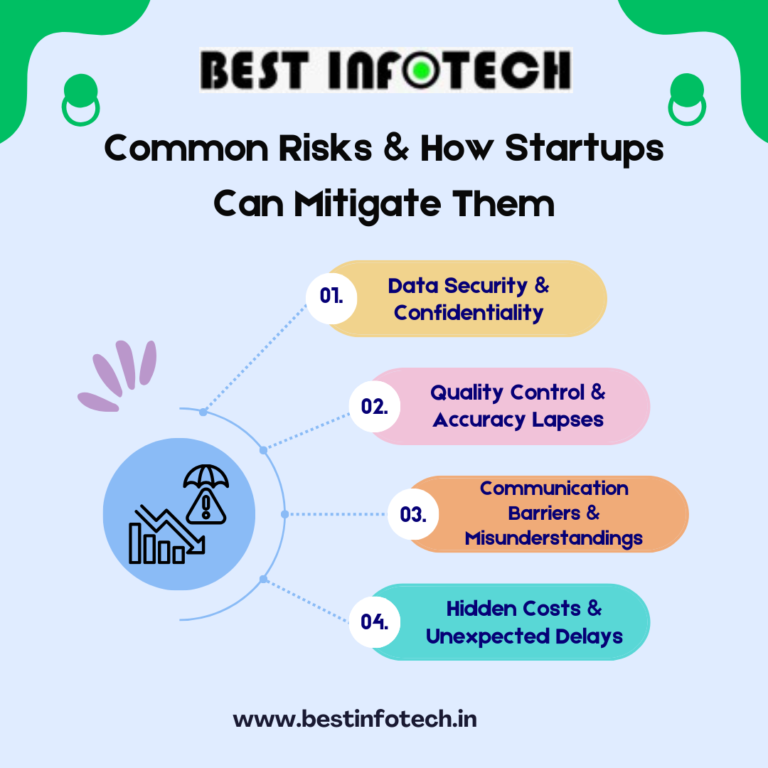How Outsourced Data Entry Can Supercharge Startup Growth
 September 23, 2025
September 23, 2025 
Starting up is chaotic. You have product development, customer acquisition, marketing, finances, hiring all demanding your time. One of the less glamorous—but significant—areas that often becomes a bottleneck is data entry: maintaining your records, updating your CRM, transcribing documents, handling invoices, digitizing paperwork.
Here’s how outsourced data entry for startups can be a game-changer: the benefits, risks, how to choose a partner, and best practices to maximize ROI.
Why Startups Should Consider Outsourcing Data Entry
1. Save Time & Focus on Core Competencies
Startups need to focus on building the product, refining the business model, scaling. Every hour spent on manual data input is an hour taken away from innovation, customer relationships, strategy.
Outsourcing lets you delegate repetitive / low-skill tasks so your internal team does what only they can do.
2. Reduce Costs & Overhead
Hiring full-time in-house staff for data entry means salary, training, infrastructure (software, hardware), management, office space. Outsourced providers often have economies of scale, lower labor costs, and more efficient processes.
Offshore or remote teams may offer lower hourly rates without compromising acceptable quality.
You can scale more flexibly: pay for what you need, increase or decrease workload without layoffs or onboarding hassles.
3. Access to Expertise, Tools & Quality Controls
Good outsourced data entry providers have experience, skill, and well-tested workflows for high accuracy.
They often use software / tools (OCR, validation tools, special formatting, cloud systems) that you may not have in house.
They have quality assurance procedures: error checking, second reviews, performance monitoring.
4. Scalability and Flexibility
As your startup grows, volume of data will often grow unpredictably (e.g., new customers, more forms, more sales). Outsourced teams can scale up rapidly to handle volume spikes, seasonal variation, or special projects.
Also offers geographic or time-zone flexibility, which can help meet tight deadlines or work outside your normal working hours.
5. Improve Data Accuracy, Reliability & Decision Making
Clean, accurate data is the foundation for making good business decisions: customer insights, financial reporting, inventory management, forecasting.
Poor data entry or delays lead to errors, misinformed decisions, maybe even regulatory or legal issues. Outsourced specialists help ensure data is entered correctly, validated, and available when you need it.

Common Risks & How Startups Can Mitigate Them
While the upside is significant, outsourcing data entry isn’t without pitfalls. Here are some common ones and how to safeguard:
1. Data Security & Confidentiality
Risks: leaking sensitive data, poor access controls, non-compliance with things like GDPR, HIPAA etc depending on domain.
Mitigation: Choose a provider with strong security policies, NDAs, encryption, secure data transfer protocols. Clarify responsibility for breaches. Ensure physical security if documents are handled. Ask for certifications or compliance proof.
2. Quality Control & Accuracy Lapses
Even good providers can make errors if workflows are vague, oversight is weak, or data specifications are unclear.
Mitigation: Clearly define data formats, error tolerances, examples; require test runs or sample entries; have periodic audits; use feedback loops; monitor performance via metrics like error rate, turnaround time.
3. Communication Barriers & Misunderstandings
When outsourcing (especially offshore or remote teams), language, time zones, cultural expectations can lead to miscommunication.
Mitigation: Regular touchpoints; clear instructions/specifications; using collaboration tools; using project managers or liaisons; ensuring you and the provider agree on common terms and expectations.
4. Hidden Costs & Unexpected Delays
Sometimes contracts look cheap but have hidden fees (revisions, quality fixes, data reformatting, delays). Also delays due to under-staffing, unclear scope, etc.
Mitigation: Get detailed quotes; clarify what is included; define SLA (Service Level Agreements); request sample turnaround times; plan buffer times.
How to Choose the Right Outsourced Data Entry Partner
To get maximum benefit, selecting the right provider is key. Here are criteria and steps to help you choose well:
1. Define Your Needs First
What types of data entry? (manual-entry, OCR, invoice processing, web forms, image digitization, audio/transcription etc.)
What volume? How frequent? What turnaround time do you require?
What format, what level of accuracy? Are there domain-specific requirements (legal, medical, financial etc)?
Budget range.
2. Check Experience & Reputation
Look for providers that have worked with startups or companies in your domain.
Examine reviews, case studies, references. Ask for sample work or trials.
See how they handle scale and seasonal peaks.
3. Evaluate Security & Compliance
Data protection protocols, encryption, access control.
Policies for confidentiality (NDAs).
Compliance with any regulations relevant to your startup (e.g. GDPR, industry specific).
Disaster recovery & backup.
4. Quality Assurance Processes
Do they have a review process, checking for errors?
How do they track and report KPIs? (error rate, turnaround, consistency)
Are there escalation procedures in case of issues?
5. Flexibility & Scalability
Can they quickly scale up / down?
Can they handle unexpected surges?
Are they able to adapt to different formats / changing requirements?
6. Communication & Project Management
Time zones, overlap hours, response times.
Use of project management tools / dashboards.
Dedicated account manager or point of contact.
Language proficiency.
7. Pricing Transparency
Clear costing: per record, per hour, per batch etc.
Hidden fees clarity: extra revisions, formatting, etc.
Payment terms, trial offers, satisfaction guarantees.
Sample Workflow: Startup Uses Outsourced Data Entry
To illustrate how a startup can integrate outsourced data entry, here’s a sample workflow:
Assess tasks: Identify which data entry tasks are draining internal resources (e.g. invoice scanning, customer feedback forms, product cataloguing).
Find providers: Shortlist 2-3 based on criteria above. Request quotes and sample tasks.
Pilot run: Give a small batch of data to test accuracy, turnaround, communication. Evaluate results.
Set up SLA & Contract: Define all deliverables, formats, turnaround times, error thresholds, confidentiality clauses.
Onboard: Provide the provider with templates, data fields, sample data, style guides. Train, if necessary.
Roll out full operations: Once pilot is satisfactory, start regular data workflows.
Monitor & Improve: Track metrics like error rate, turnaround, cost per unit. Hold periodic reviews with provider. Adjust process or provider as needed.
Why Outsourced Data Entry Is Especially Suited for Startups
Startups often operate under tight budgets and limited staff, so shifting non-core tasks is more attractive.
They also need agility: being able to respond fast to changing data needs, market feedback etc. Outsourced data entry gives you that flexibility.
Data processes and systems are often undefined in early stages; bringing in a partner not only helps execution but can supply best practices for data hygiene, workflows, documentation.
Tips & Best Practices to Maximize ROI
Always begin with a small pilot before scaling the engagement fully.
Maintain clear documentation: data field definitions, input formats, naming conventions.
Establish frequent checkpoints or audits.
Provide feedback regularly so the provider can improve.
Use automation where possible: OCR, data validation scripts, tools to reduce manual effort.
Build in redundancy/back-ups in case provider misses deadlines or quality dips.
Conclusion
For startups, outsourced data entry is not just a cost-saving tactic—it can unlock capacity, accuracy, and scalability. When done with thought—choosing the right partner, clear definitions, strong communication—it can free you to focus on the big picture: growing your product, serving customers, refining your strategy.
Ready to streamline your data workflows and scale smarter without adding overhead?
Contact us at Best InfoTech today. Let’s talk about your data entry needs, show you how our experts ensure accuracy, security, and fast turnaround — so your startup can grow faster.
Contact us today